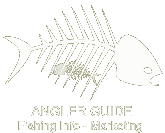 |  |
|
Navigation - Business - Great Lakes - Great Plains - Northeast - Northwest - Rocky Mountains - Southeast - Southwest - Technology - Trophy Catches
|
As it happens, there’s no better time than right now, June being an axtraordinarily beautiful month in Wisconsin. And one of the best -- almost-guaranteed -- ways to work this magic is to take a youngster “giggle fishing.” That’s what Dave Bell of Amherst called it many years ago when he taught a novice (clumsy) fly fisherman how to catch bluegills in June. It’s so easy and so much fun, he argued, you can’t help but giggle. Giggle fishing works with spinning gear, too, or even a cane pole with 10 feet of fishing line tied to the end. The key is that at some point in early to mid June, depending on your location in Wisconsin, bluegills move into the shallows to prepare for spawning. The males use their fins to scoop out a “spawning bed” in the sand or gravel, generally in or near some sheltering bull rushes or other emergent vegetation. These spawning beds are easy to spot, being about the size of a dinner plate and of lighter color than the surrounding lake bottom. You don’t have to find spawning beds to fish bluegills, but if you do spot them, chances are you’re golden. Just before and after spawning, the bull males will aggressively attack just about anything that shows up near the nests – like a chunk of worm or a fishing lure, for instance. With a light fly rod it is terrific fun to toss a small foam spider or ant onto the water’s surface, just at the edge of the bull rushes or lily pads, and then watch with mounting anticipation as a narrow, dark-colored shape (the bluegill’s back) zeroes in on the lure like a torpedo with a homing device. A small spinning rod equipped with a closed-face reel, 6-pound test, a small bobber, a tiny split shot for weight and a number 10 hook with a worm or piece of worm dangling from the bend works great, too. When the fish strikes, the child lifts the rod and the battle begins. The scrappy bluegill slashes back and forth in a high-speed frenzy of fantastic motion, flipping itself sideways against the pull of the line to gain maximum resistance with its disc-shaped body. The rod vibrates as if possessed. That’s when the giggling starts. This is real action, not the digital imitation, and it is played out in the open air, on a beautiful lake, where land and sky and water come together to form a shining memory. “Expose kids to fishing, hopefully turn them onto to it, and when they get older, they’ll do it forever,” said Mike Buroker, proprietor of a bait and tackle shop in Eau Claire. Unfortunately, many adults make a big mistake when they attempt to do this. They want to catch fish, too, and that’s a bad idea, Buroker said. The adult has to have a fishing license, but should concentrate on helping the child fish. Even better, Buroker said, is for the adult to “pre-fish” the lake, finding the bluegills so the youngsters can get right into the action when it’s their turn. “You can’t get skunked. “Too much is at stake. You are creating a conservationist, someone who will grow to understand the delicate balances and intricate connections in nature, someone who will have a passion for protecting Wisconsin’s natural resources,” he said. If you don’t know much about fishing, don’t be afraid to visit a bait shop and ask for help. Bait dealers sometimes look scary, but that’s just because they work 70 hours a week. If you’re honest and admit you don’t know what you are doing, most will bend over backwards to help and will point you at good bluegill lakes. Always be safe on and near the water. If the sky turns black, head for home. Be flexible. If the fish aren’t biting, go swimming instead. Skip some stones. Have plenty of refreshments handy. For more tips, including how to catch panfish after the spawn, check out the “Panfishing Pointers” page of the DNR Web site. Don’t worry about the giggling. When the bluegills bite, that will happen by itself.
Comments
«Back | News Home
| |||||||||||||||||||||||||||||||||||